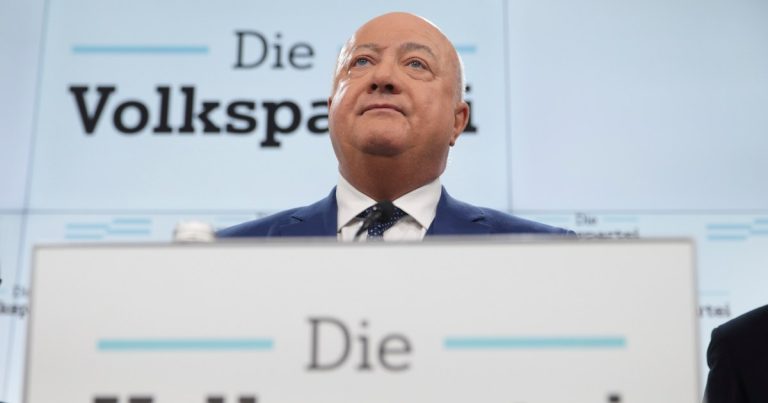In a major U-turn, Christian Stocker says he will enter into coalition talks with the far right if invited.
Austrian conservatives have said they are ready to begin negotiations with the far-right Freedom Party (FPO) to form a new government, in a political reversal after coalition talks with the Social Democrats and the liberals. broken-down.
The European Union country was plunged into political turmoil after conservative Chancellor Karl Nehammer on Saturday halted negotiations to form a centrist government without the far right, the party that won the most votes in the country’s national elections. september.
Following the collapse, Nehammer said he would step down as chancellor and chairman of the People’s Party (OVP) in the coming days to allow for an “orderly transition”. He has held both positions since the end of 2021.
At a conservative leadership meeting on Sunday, ÖVP general secretary Christian Stocker was chosen as interim party leader.
Stocker has long repeated Nehammer’s position that the ÖVP would not govern with the far right, but he said that the situation had now changed and that he had been authorized by his party to begin coalition negotiations with the far right. FPÖ if he was invited.
“This country needs a stable government right now, and we can’t continue to waste time on campaigns or elections we don’t have,” Stocker said.
“I expect that the leader of the party with the most votes will be responsible for forming a future government. If we are invited to these (coalition) talks, we will accept that invitation.”
Earlier on Sunday, Austrian President Alexander Van der Bellen said he would meet FPÖ leader Herbert Kickl on Monday, amid growing speculation that he might ask the far-right politician to form a government .
Van der Bellen, a former leader of the left-wing Greens who expressed reservations about appointing Kickl as chancellor, angered the FPÖ by not asking it to form a government after the election, on the grounds that no other party was prepared to join it in a coalition.
While claiming the situation had now changed, Van der Bellen stopped short of saying he would ask Kickl to lead coalition negotiations. He is due to meet Kickl on Monday at 11:00 a.m. (10:00 GMT) and a new interim chancellor will also be named in the coming week, with Nehammer remaining in office until then.
“Within the SVP, the voices which exclude cooperation with a Herbert Kickl FPÖ have become much quieter. This means that a new path could open up, which did not exist before,” Van der Bellen said in a speech to the nation.
Kickl gained significant support in the September elections, ensuring almost 30 percent of the votes for the first time.
The conservative OVP party came second, with 26 percent, while the center-left Social Democrats (SPOe) gained 21 percent.
The rise of the FPÖ in Austria echoes a broader global trend, including the rise of far-right figures in recent years, notably in the United States, Argentina and Italy, among other countries.
The FPO, which has never led a government in Austria, has advocated more right-wing policies, including stricter border controls and suspending the right to asylum through emergency legislation.
In addition, the party proposed ending sanctions against Russia and openly criticized Western military aid to Ukraine.
The party also expressed interest in withdrawing from the European Sky Shield Initiative, a missile defense project initiated by Germany.
Kickl has often criticized Brussels “elites” and called for the repatriation of certain EU skills to Austria.
Stocker previously called Kickl a “security risk” for the country.


